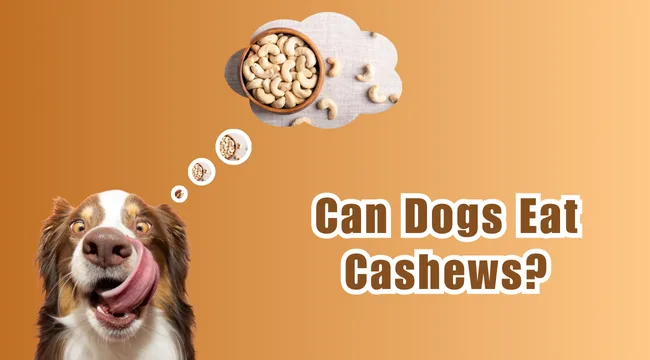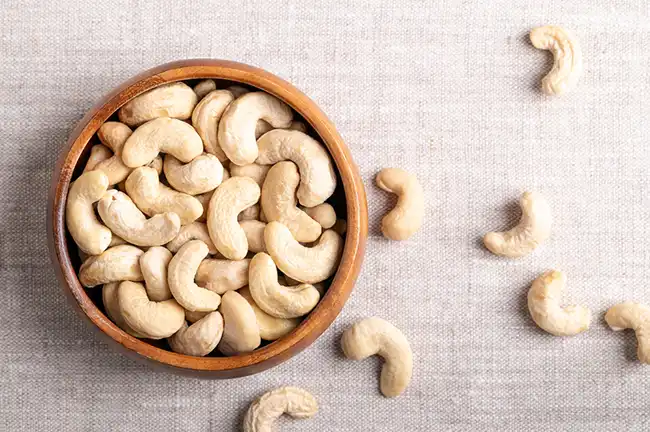Can Dogs Eat Cashews? 5 Shocking Risks Every Owner Faces

As a dog owner, you want to give your pet the best—sometimes even sharing little bites of your own snacks. Cashews may seem like a fun treat to share, but is it really safe for your furry friend? Can dogs eat cashews? The answer isn’t as simple as yes or no. While cashews are not poisonous for dogs when offered in small amounts, there are still important things you should know first.
In this article, we’ll share five key facts every dog owner needs before feeding cashews to their pup. We’ll talk about the good points, the possible risks, and how to make the safest choice for your dog. Before reaching for the snack jar, let’s find out if cashews are a smart treat for your best friend!
Can Dogs Eat Cashews?
Yes, dogs can eat cashews—but only in small amounts and as an occasional treat.

Why is this the case?
Cashews are not toxic to dogs, which means that if your pup sneaks a nut or two, it’s usually okay. However, there are some important things to remember before sharing this snack.
Cashews are high in fat. Too many can upset your dog’s stomach or even cause weight gain and pancreatitis, a painful illness. Always keep portions small.
Salted or flavored cashews should be avoided. Added salt, spices, or seasonings can be harmful for dogs, causing tummy troubles or worse.
Some dogs may also be allergic to nuts, just like people. Watch for signs like itching, swelling, or stomach upset if your dog tries cashews for the first time.
For a safe treat, offer your dog a plain, unsalted cashew—just one or two. Treats like this should never replace their healthy meals. And if your dog has special health needs, it’s always best to ask your vet before you try new foods together.
Your dog’s health and happiness always come first!
3 Health Benefits of Cashews for Dogs
1. Filled With Good Nutrients
Cashews have lots of things that are good for your dog. They are a natural source of protein, which helps your dog build strong muscles. Cashews also give your pup important minerals like calcium, copper, magnesium, iron, manganese, phosphorus, and zinc. These minerals keep your dog’s bones strong and support healthy energy. Cashews have vitamin K, too, which helps blood clot and protects your dog’s bones.
2. Antioxidant Power
Cashews are packed with antioxidants. These work like little shields, protecting your dog’s body from harm. Antioxidants help support your dog’s heart, immune system, and may even lower the risk of some illnesses. They can also keep your dog looking young and feeling happy by fighting off cell damage.
3. Healthy Fats for Skin and Coat
Cashews give your dog omega-3 and omega-6 fatty acids. These are the “good fats” that help control swelling and keep your dog’s immune system strong. Even better, they make your dog’s coat shiny and smooth and help stop dry, itchy skin. A dog with a healthy coat is always nice to cuddle!
Remember:
Cashews can be a fun treat, but only offer plain, unsalted ones. Keep it to just a few, or your dog’s tummy might get upset. Treats made for dogs are safest, but a small cashew now and then can be okay. When you’re not sure, ask your vet. Keeping your dog happy and safe is what matters most!
5 Risks of Feeding Dogs Cashews
Cashews can be a tasty treat, but too many are not good for your dog. Here are five risks you should know about before sharing cashews with your furry friend:
1. Upset Stomach
Cashews are high in fat and protein. If your dog eats too many, they might get an upset tummy. This can lead to vomiting, diarrhea, or bloating, especially if your dog eats a lot at once.
2. Weight Gain
Cashews are high in calories. Giving your dog these snacks often can make them gain weight. Too much weight can cause other problems like sore joints, trouble moving, and even diabetes.
3. Pancreatitis
The fat in cashews can put stress on your dog’s pancreas. If the pancreas gets overwhelmed, it can become inflamed—a condition called pancreatitis. Pancreatitis can be very serious and needs a vet’s care right away.
4. Allergies
Some dogs are allergic to cashews. Watch for signs like itching, swelling, or hives, especially when your dog tries cashews for the first time. If you see these signs, stop giving the treat and call your vet.
5. Bladder Stones
Cashews have oxalates, which can lead to bladder stones. These stones are painful and can cause trouble when your dog tries to pee.
A Caring Reminder:
Only give your dog a small amount of plain, unsalted cashews from time to time. Always watch how they react. If you’re not sure if cashews are safe for your dog, check with your vet first. Your dog’s health and happiness always come first!
Related Post: Can Dogs Eat Brazil Nuts? Risks & Safety Explained
How to Safely Feed Your Dog Cashews
If your dog is trying cashews for the first time, watch them closely. Some dogs may have allergies. Look for signs like itching, swelling, or tummy upsets after eating the nut.
Tips for Safe Feeding:
1. Check for Mold
Moldy cashews can make your dog very sick. Mold may contain toxins that are harmful. Always look over the nuts and make sure they look fresh before sharing.
2. Pick Plain Cashews
Only give your dog plain, unsalted cashews. Avoid any nuts with added salt, sugar, or flavorings. Flavored or salted nuts can upset your dog’s stomach and harm their health.
3. Remove All Shells
Cashew shells are tough and dangerous. They can be a choking risk and are hard for dogs to digest. They also contain a chemical that can be toxic. Always check the nuts and remove any shell pieces.
4. Keep Portions Small
Cashews should only be a small treat. The “10 percent rule” is a good guide—treats, including cashews, should be no more than 10% of your dog’s daily food. Most of their diet should be healthy dog food.
A Caring Reminder:
Following these steps will help your dog enjoy cashews without risk. When in doubt, talk to your vet before adding new foods. Your dog’s health and happiness matter most!
Can You Feed Your Dog Cashew Milk and Cashew Butter?
Cashew milk and cashew butter can be safe for dogs if you give them in small amounts. Like whole cashews, these treats should only be offered once in a while, not every day.
But always check the label first! Many nut butters contain xylitol. This sweetener is very dangerous for dogs, even in tiny amounts. Stay away from any product with xylitol or extra sugar. Also, watch out for added oils or flavors, which can upset your dog’s stomach and cause weight gain.
If you want to share a taste, pick plain and unsweetened cashew milk or butter, with no added ingredients. As always, treats like these should be rare. Your dog’s main diet should be healthy pet food.
If you are ever unsure, ask your vet before letting your dog try something new. Your dog’s safety always comes first!
Before Sharing with Your Dog
While some human foods may be safe for dogs, others can cause adverse reactions. Always consult with your veterinarian before introducing any new food into your dog’s diet. This article is intended for educational purposes only and should not replace professional medical or dietary advice.
FAQ.
Can dogs safely eat cashews?
Yes, dogs can eat cashews! Unlike macadamia nuts, which are toxic, cashews are generally safe. But before sharing, there are a few things to keep in mind—like portion size and avoiding added salt or flavors. A few plain cashews here and there are fine, but moderation is key!
Are cashews good or bad for dogs?
Cashews aren’t toxic to dogs, but they can be bad if overfed. Their high fat content may lead to weight gain, pancreatitis, or digestive issues. Salted or flavored cashews can also cause dehydration. To be safe, only offer plain, unsalted cashews in small amounts—or avoid them altogether.
How many cashews can a dog eat?
Small dogs can have one to two cashews, while larger dogs can eat up to five to ten in a day. Cashews should be an occasional treat, making up no more than 10% of daily calories. Always choose plain, unsalted cashews and watch for any signs of stomach upset.
What happens if my dog eats too many cashews?
If a dog eats too many cashews, they may have vomiting, diarrhea, or stomach pain due to the high fat content. Over time, this can lead to pancreatitis, weight gain, or diabetes. Always feed plain, unsalted cashews in small amounts and watch for any signs of digestive issues.
Are cashews toxic to dogs?
No, cashews aren’t toxic to dogs, but they’re high in fat and can cause digestive issues if overfed. Always choose plain, unsalted cashews and feed them in moderation. Watch for signs of stomach upset like vomiting or diarrhea, and avoid cashews if your dog has pancreatitis or weight issues.
Can puppies eat cashews?
Yes, puppies can eat plain, unsalted cashews, but only in tiny amounts. They can be a choking hazard and may cause stomach upset or allergies. Always introduce new foods slowly and consult your vet before feeding cashews to ensure they’re safe for your puppy’s diet.



